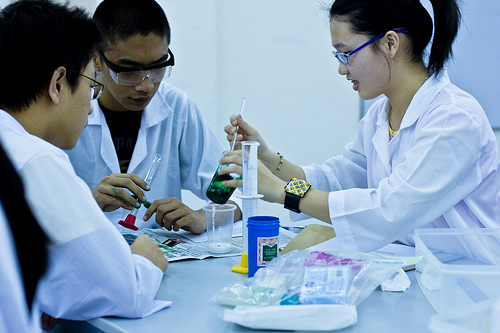Grad school: not just a plan B for med school applicants
What you need to know about MD-PhD programs
Share
 Thousands of students apply to medical school across Canada every year, and the vast majority of them will never even make it to an interview. The chances of success improve for repeat applicants, but the fact remains: even with high marks and stellar extracurricular activities, applying to a Canadian med school is an uphill battle against discouraging statistics. After completing their undergraduate degree and receiving a rejection letter, the big question facing these students is: now what?
Thousands of students apply to medical school across Canada every year, and the vast majority of them will never even make it to an interview. The chances of success improve for repeat applicants, but the fact remains: even with high marks and stellar extracurricular activities, applying to a Canadian med school is an uphill battle against discouraging statistics. After completing their undergraduate degree and receiving a rejection letter, the big question facing these students is: now what?
Mike Saccone, a fourth-year Health Studies Co-op student, already has a plan B.
“My back-up plan is research based. I will pursue a Masters in Health Research Methodology from McMaster University,” he says. The Masters degree could even hit two birds with one stone.
“Hopefully, this will improve the chances of me getting into medical school, along with fulfilling a degree requirement that I will eventually pursue.”
Saccone says he was exposed to both sides of medicine- research and patient care- while working with a research-focused orthopaedic surgeon, and then working with a surgeon whose primary focus was on patient care.
Colleen Shortt, a fourth year Health Studies and Gerontology student, isn’t considering research as a backup plan to med school. She recently applied to graduate school programs at the University of Toronto, the University of Western Ontario, and McMaster, and is hoping to pursue a career in cancer or HIV/AIDS research. Shortt says that once she’s through grad school she may be interested in applying to med school.
“I thought about applying to med school and originally it was my plan A. But once I started looking into research opportunities I found that this may be a more effective way of reaching more people.”
Khuram Bhatti, a fourth year arts and science student, says he has considered numerous programs and careers, including optometry or pharmacy, and even programs in the States.
“I am considering schools such as the osteopathy programs in the United States, or other types of up and coming schools which have a schooling regiment which is sort of ‘newer,’ comparatively to something such as the MD career field.”
For med school hopefuls who don’t make the cut, pursuing a grad school program is a win-win: it improves their chances on a second application, and at the same time, they’re developing the skills for a different career path. Many med schools look for research or medically-related experience, and some even award additional points to applicants who have completed a graduate degree. McMaster gives an additional 1% to the pre-interview score of MSc students, and an additional 4% for PhD students. Others, such as the University of Toronto, lower the GPA cutoff for graduate students.
Keith Colaco, a third year Biomedical Sciences student, says that although he has always wanted to attend med school and become a physician, in high school he considered becoming an optometrist because of the challenges of pursuing a career in medicine.
“As I started taking more medically-related courses in university, volunteering in hospitals and speaking to medical students, I quickly changed my mind because I was so intrigued by the field and strongly felt the need to help those with medical problems.”
This summer Colaco will be working at the Holland Orthopaedic and Arthritic Centre in Toronto, where he hopes to gain insight into pursuing a medical career. Ultimately, he may combine his passion for medicine and research.
“I am very interested in clinical research rather than focusing on just research in the lab because I have always enjoyed interacting with patients in past volunteer experiences,” he says. “By working in a patient-care setting, it allows me to evaluate patients and conduct research at their bedside.”
Students like Colaco, who want to combine research with patient interaction, are in luck: an MD-PhD program offers the best of both worlds, allowing students to complete the MD curriculum while pursuing a PhD, training them for careers ranging from medical research to the design of healthcare delivery systems. Most of the programs describe their graduates as ‘clinician-scientists,’ with the curriculum juggling between academic course work, training in basic sciences and research, and clinical rotation. Dr. Norman Rosenblum, Director of the MD/PhD Program at the University of Toronto, says that applicants should have “considerable background with some area of science” in addition to experience that “demonstrates an interest in medicine and a knowledge of the clinician-scientist role.”
Some programs, such as the “MD Plus” Leaders in Medicine program at the University of Calgary, go beyond the basic sciences and allow students to pursue any graduate-level field of interest, including a Masters in philosophy or business.
Most med schools across Canada offer the MD-PhD program, with many being created in the past several years. The only drawback? Getting in is even tougher than med school. The program requires students to be accepted into both a medical and a Masters program (or in some cases, a graduate program) and enrollment is extremely limited, with most MD-PhD programs only having enough spots for a handful of students. For example, there are only five spots available in the University of Toronto MD-PhD program, while the University of Ottawa program only has room for four.